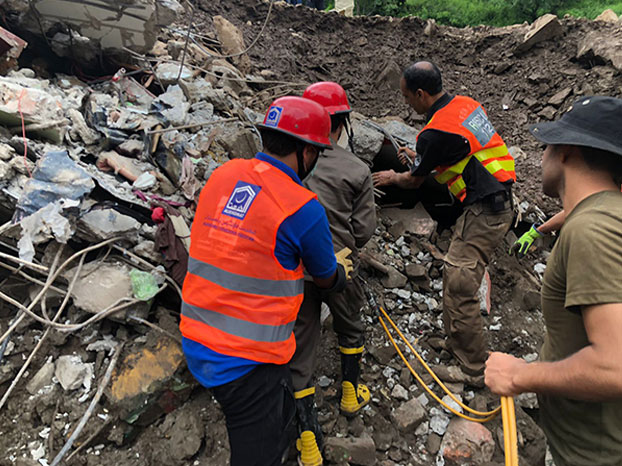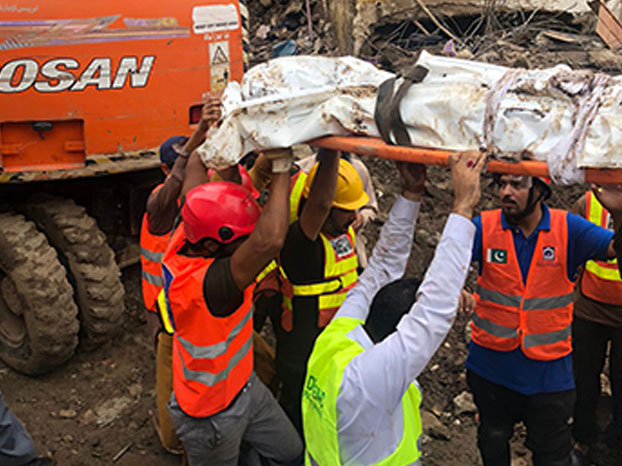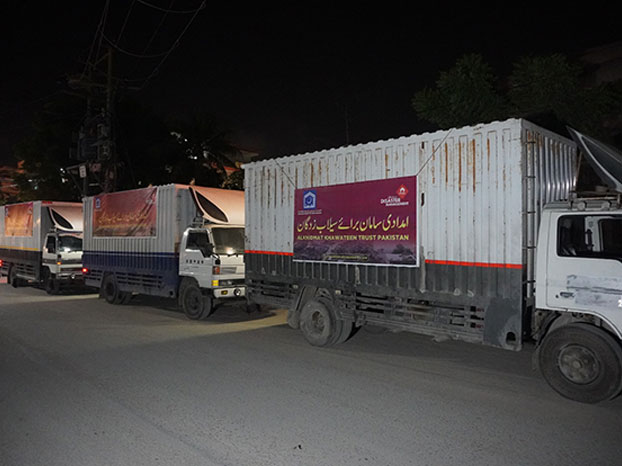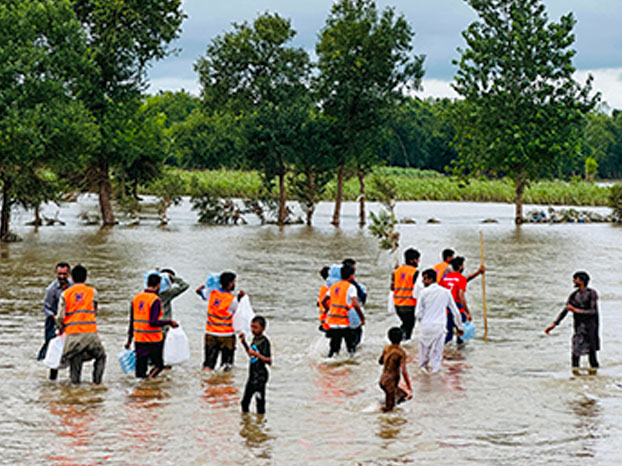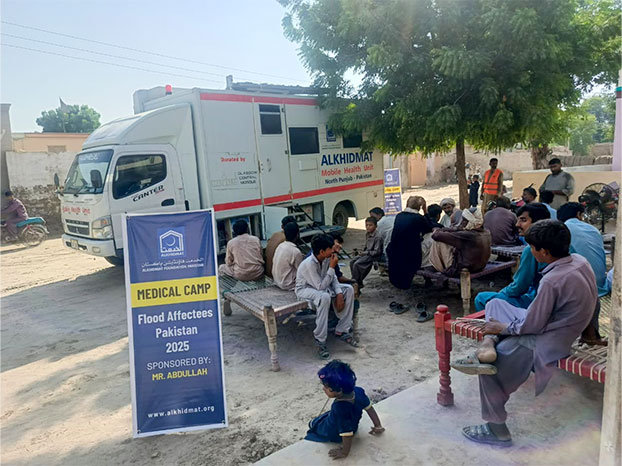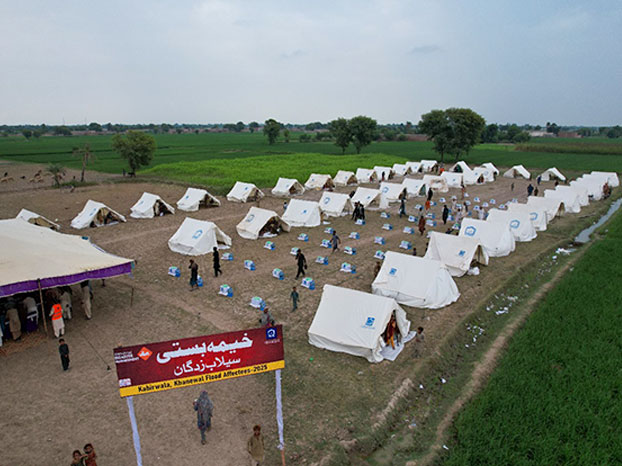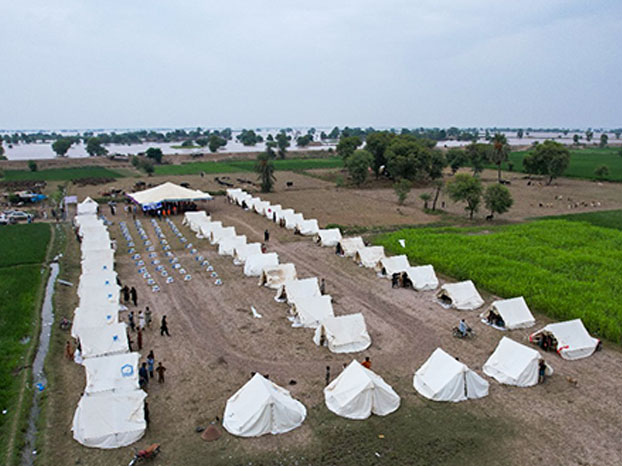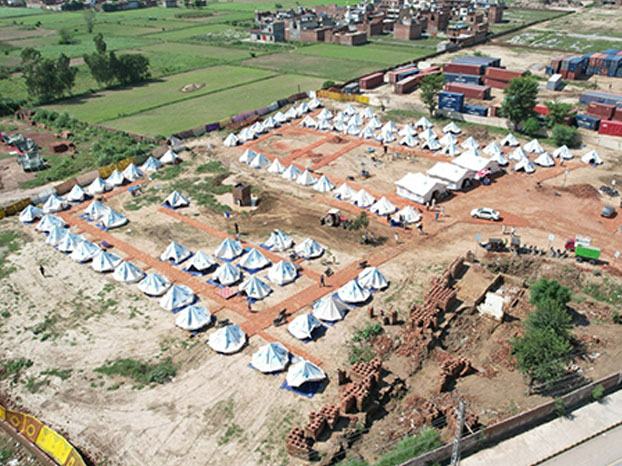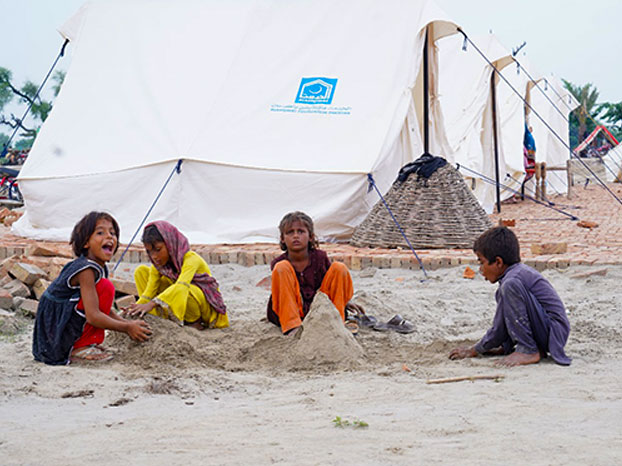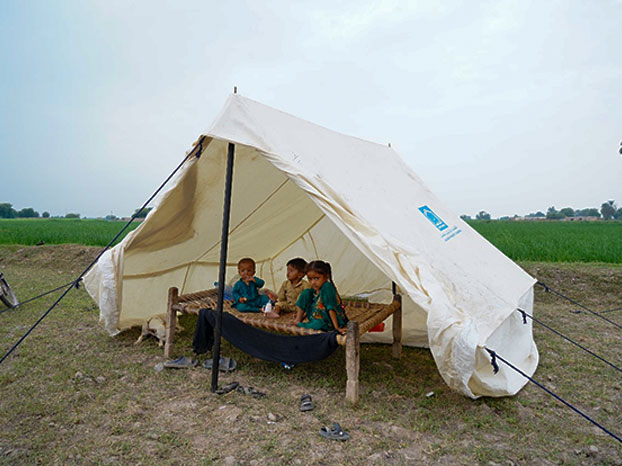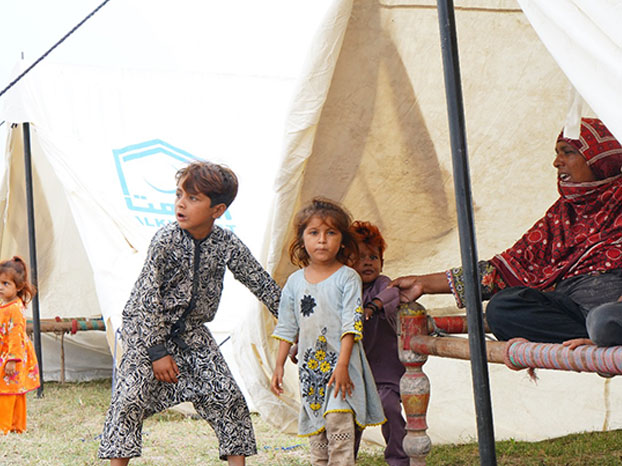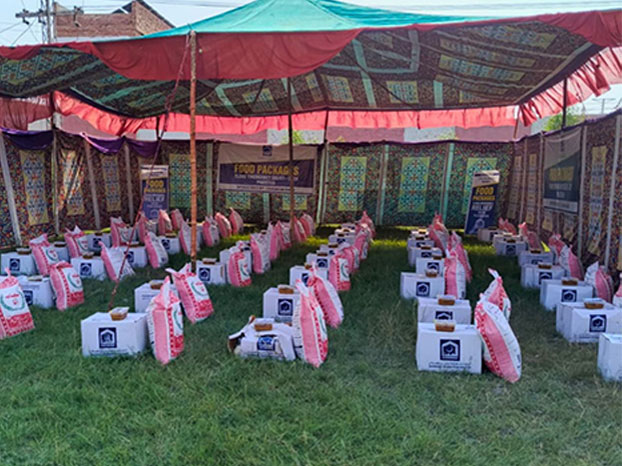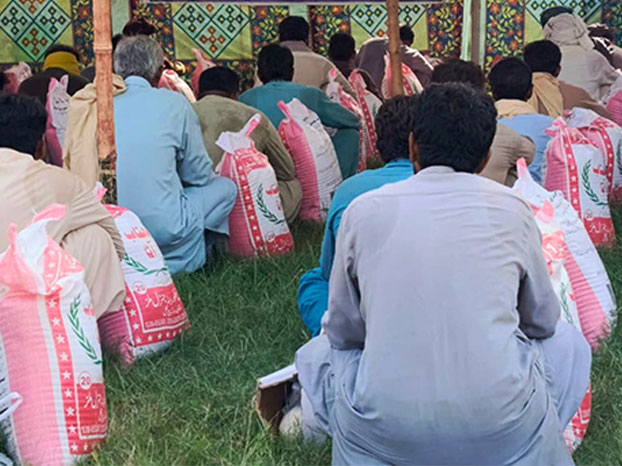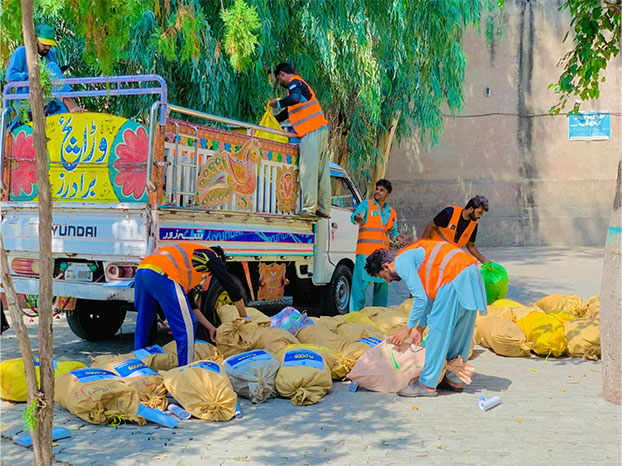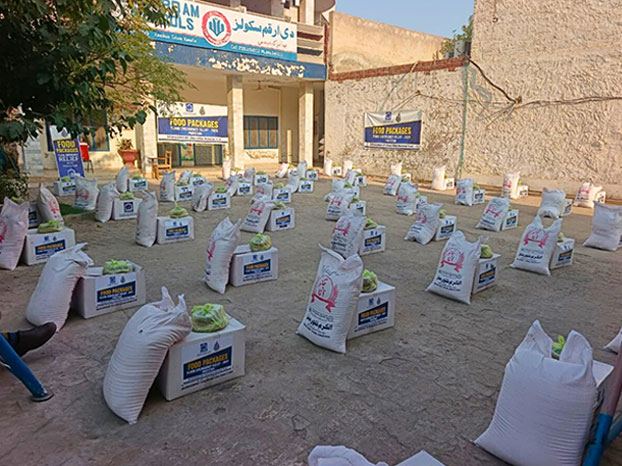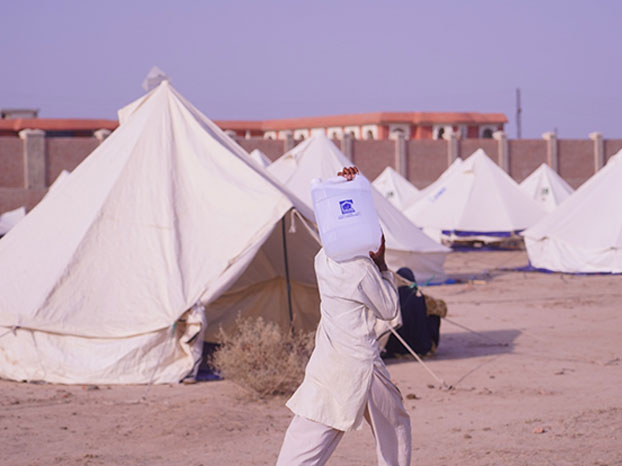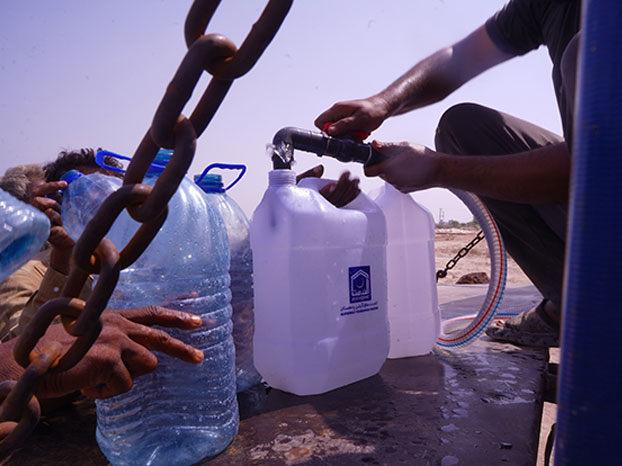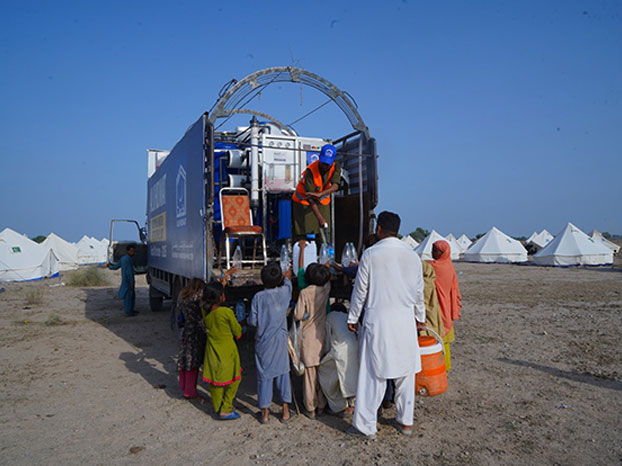
Pakistan Floods 2025
Since June 2025, Pakistan has faced devastating monsoon floods that claimed nearly 1,000 lives, displaced over a million people, and destroyed thousands of homes and vital infrastructure. Massive rescue efforts saved over 33,000 people, established 17 tent cities for displaced families, and provided emergency shelters, food, clean water, and medical care, while volunteers and relief workers worked tirelessly across affected provinces. Now, as immediate rescue operations wind down, the focus will shift toward rebuilding: restoring homes, repairing schools and health facilities, strengthening water and sanitation systems, upgrading living conditions in the 17 tent cities, and supporting livelihoods to help families recover and prepare for future climate-driven disasters.
“Almost 1037 deaths have been reported nationwide since June 26.”
Donate
Crisis Updates - Floods in Pakistan
Torrential rains and flash floods have devastated many parts of Pakistan, leaving thousands homeless and without basic necessities. Entire communities are struggling for shelter, food, and clean water as floodwaters continue to rise. Families urgently need support to survive this crisis and begin rebuilding their lives.
Latest Flood Updates Across the Pakistan
- 🚨 Muzaffargarh: Alkhidmat distributed ration packs to flood-affected families in Alipur. During the floods in Muzaffargarh, hundreds of Alkhidmat volunteers took part in rescue and relief operations at various locations. Relief activities, including the provision of ration packs and relief supplies, are still ongoing to support the affected families.
- 🚨 Buner: Alkhidmat distributed winter packs and kitchen utensils to 150 flood-affected families. During the recent cloudburst and floods in Buner, thousands of Alkhidmat volunteers participated in rescue and relief operations across various locations. Relief efforts, including the provision of ration packs, winter supplies, and other essential items, are still ongoing to help restore the lives of thousands of affected families
- 🚨 Chiniot: Alkhidmat distributed kitchen sets to flood-affected families. The distribution was organized by Alkhidmat together with United Trademark & Patent Services. During the floods in Chiniot, hundreds of Alkhidmat volunteers took part in rescue and relief operations at various locations. Relief activities, including the provision of ration packs and kitchen supplies, are still ongoing to help restore the lives of affected families.
- 🚨 Toba Tek Singh: Alkhidmat distributed a one month ration to flood-affected families.
- During the floods in Toba Tek Singh, hundreds of Alkhidmat volunteers took part in rescue and relief operations at various locations. Relief activities, including the provision of ration packs and relief supplies, are still ongoing to support the affected families.
- 🚨 Sialkot: Alkhidmat organized a medical camp to provide healthcare to flood-affected families. The medical camp was organized by Alkhidmat in collaboration with Soorty DenimKind, providing flood affectees with free medicines after medical checkups.
- During the floods in Sialkot, hundreds of Alkhidmat volunteers took part in rescue and relief operations at various locations. Relief activities, including the provision of medical aid and relief supplies, are still ongoing to support the affected families.
- 🚨 Tandlianwala: Alkhidmat distributed a one month ration to 100 flood-affected families. The distribution was organized by Alkhidmat together with One Ummah. During the floods in Tandlianwala, hundreds of Alkhidmat volunteers took part in rescue and relief operations at various locations. Relief activities, including the provision of ration packs and relief supplies, are still ongoing to support the affected families.
- 🚨 Gujrat: Alkhidmat distributed bedding to 1,400 flood-affected persons. President Alkhidmat Prof. Dr. Hafeez ur Rehman attended the bedding distribution ceremony as the chief guest and addressed the attendees. Praising the tireless efforts of Alkhidmat volunteers in Gujrat, he paid tribute to the Alkhidmat volunteers for protecting precious lives and property. He reiterated Alkhidmat’s commitment to extending all possible support to flood-affected families.
- 🚨 From Karachi to Punjab, three containers of relief goods were dispatched for flood-affected families in Punjab.The relief consignment includes supplies for 600 affected families, 4,000 mosquito nets, 300 bags of rice, 300 bags of flour, mats, utensils, hygiene kits, and clothing.
What Flood Affected Families Need Most
Thanks to the emergency response, thousands of families have already received tents, tarpaulin sheets, mosquito nets, blankets, food packages, and cooked meals to survive the immediate crisis. Now the focus will shift from urgent relief to recovery and rebuilding. Efforts will include improving living conditions in the 17 tent cities, ensuring consistent food supplies, upgrading shelter facilities to withstand changing weather, and helping families move toward permanent housing solutions. Your continued support will make it possible to transition from survival to stability, giving these families a chance to rebuild their lives with dignity.
- Folding Bed
- Winter Package
- Financial Assistance
- Hygiene/Dignity Kit
- Medical Camp
- Kitchen Set
- Water Tank
Ways To Donate
Become Volunteer
Bank Transfer
Account Title: Alkhidmat foundation Pakistan Zakat
Account no. (PKR): 3880067845100081
IBAN: PK16BPUN3880067845100081
SWIFT code: BPUNPKKA002
Meezan Bank (For General Donation)
Account Title: Alkhidmat Foundation Pakistan
Account no. (PKR): 02430101034665
IBAN: PK11MEZN0002430101034665
SWIFT code: MEZNPKKA
To receive your donation slip, please WhatsApp your transaction slip to: +923000776016
Doorstep Collection
Situational Reports, Current Overview & Our Response
This situational report provides an updated overview of the ongoing crisis, highlighting the affected regions, immediate needs, and the actions taken by response teams on the ground. It summarizes key data, outlines humanitarian efforts, and identifies urgent areas requiring support to ensure a coordinated and effective response.

Pakistan Flood Report, Jul 14,2025

Pakistan Flood Report, Jul 21,2025

Pakistan Flood Report, Jul 24,2025

Pakistan Flood Report, Jul 28,2025

Pakistan Flood Report, Aug 1,2025

Pakistan Flood Report, Aug 8,2025

Pakistan Flood Report, Aug 16,2025

Pakistan Flood Report, Aug 18,2025

Pakistan Flood Report, Aug 22,2025

Pakistan Flood Report, Aug 24,2025

Pakistan Flood Report, Aug 29,2025

Pakistan Flood Report, Sep 01,2025

Pakistan Flood Report, Sep 05,2025

Pakistan Flood Report, Sep 09,2025

Pakistan Flood Report, Sep 15,2025
Why is Pakistan So Vulnerable to Deadly Flooding?
Pakistan’s flood crisis isn’t just a matter of weather it’s a complex combination of climate change, poor infrastructure, and policy gaps, as explained in Al Jazeera’s in-depth report (July 17, 2025) .
Here are the key reasons Pakistan faces devastating floods year after year:
- Unpredictable and Extreme Monsoons:
Climate change has made monsoon patterns increasingly erratic. Rainfall that once spread over weeks now falls in hours, overwhelming rivers, drains, and dams not built for such intensity. - Melting Glaciers in the North:
Pakistan has over 7,000 glaciers more than any country outside the polar regions. Rising temperatures are causing glacial lake outburst floods (GLOFs), sending sudden torrents downstream that devastate villages and farmlands. - Rapid Urbanization Without Planning:
Cities like Karachi, Lahore, and Rawalpindi have expanded rapidly without proper drainage infrastructure. Green belts have turned into concrete jungles, and natural waterways have been blocked, causing urban flooding even during moderate rains. - Deforestation and Poor Land Use:
Illegal logging and land encroachment have stripped many flood-prone areas of natural barriers. With no tree cover or wetlands to absorb excess water, floods hit harder and faster.
Punjab Flood Crisis and Ongoing Relief
Following the flood emergency declared by NDMA in Punjab, heavy monsoon rains and cross-border water releases submerged villages and damaged historic sites, including the Guru Nanak shrine. More than 210,000 people were displaced, and over 20,000 residents were evacuated from Lahore and other high-risk areas as the Ravi, Chenab, and Sutlej rivers rose to dangerous levels. Now the focus will shift toward restoring essential services, strengthening river embankments, repairing damaged infrastructure, and providing long-term rehabilitation support to affected families so communities can recover and prepare for future disasters.
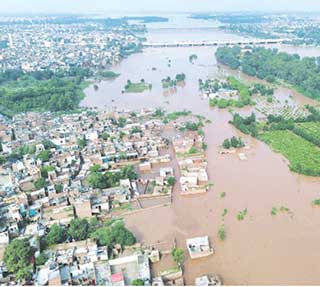
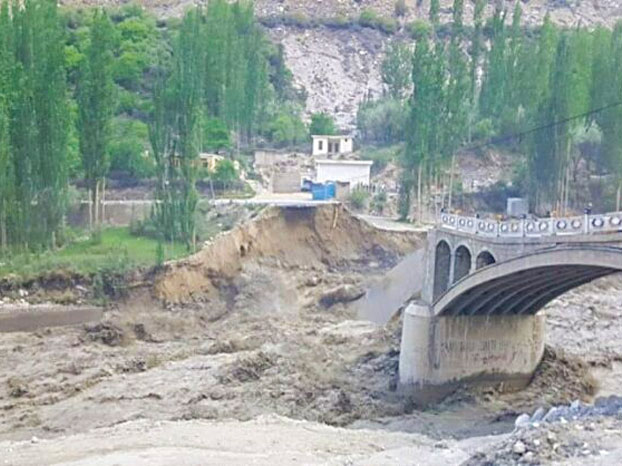
Flash Floods in Buner & Gilgit-Baltistan
Monsoon floods destroyed thousands of homes in Buner, claiming many lives, while landslides in Gilgit-Baltistan cut off the Karakoram Highway and left families stranded without essentials like food, water, and shelter.
Flash Floods in Buner & Gilgit-Baltistan - Urgent Relief
Emergency aid has reached many affected areas, providing shelter, food, clean water, and medical care. The next phase will focus on reconnecting remote communities, repairing damaged infrastructure, rebuilding homes, and helping families with long-term recovery and livelihood support.

